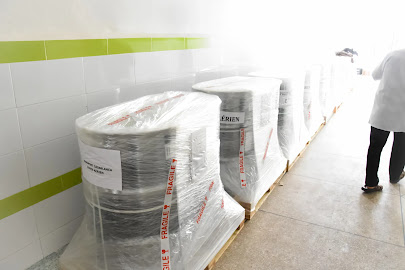Argan Oil Factory
Argan Oil Factory: A Journey Through Morocco‘s
Modern Argan Oil Factories
Introduction
Derived from
the indigenous Moroccan Argania Spinosa tree, argan oil is a
valuable and sought-after natural elixir, often referred to as “liquid
gold.” Its versatility permits its use in various applications, including
beauty and culinary industries. The emergence of modern argan oil factories in
Morocco has helped
to meet the increasing demand for this precious oil. In this article, we will
examine the production of argan oil and its importance
to local communities and the global
market.
Traditional versus Modern Production Methods
Historically,
argan oil production
required local Berber women to manually harvest, dry, and press the kernels to
extract the oil, making it a labor-intensive process.
Nevertheless,
the increasing demand for argan oil has spurred the development of modern
production facilities. These facilities are equipped with advanced machinery
that simplifies the extraction process, all while ensuring the oil’s quality
and authenticity are preserved.
The
Production Process in Modern Argan Oil Factories
Modern argan oil factories employ a
meticulous and hygienic production process to guarantee the highest quality
oil. This process comprises four steps:
Firstly,
during the harvesting season from May to August, workers collect the fallen
argan fruits from the Argania Spinosa trees.
Next, the
fruits are sun-dried, and the outer pulp is removed to obtain the argan nuts.
After that,
specialized machines are used to crack the hard shells of the argan nuts to
extract the kernels.
Finally, the
kernels are cold-pressed to extract the oil, preserving its nutrients and
properties. The unroasted kernels produce cosmetic argan oil, while the
roasted kernels yield culinary argan oil.
The Role
of Women’s Cooperatives
Argan oil factories in Morocco often
collaborate with women’s cooperatives to create job opportunities and support
the local community. These cooperatives aim to
safeguard
traditional knowledge and skills while promoting equitable wages and safe
working
environments for women engaged in argan oil production.
By working hand in hand with these cooperatives, argan oil factories help to
preserve the cultural heritage and economic well-being of the communities they
serve.
Sustainability
and Eco-Friendly Practice
Argan oil factories have prioritized sustainable and
eco-friendly practices. They
responsibly
source argan fruits, adhere to organic standards, and minimize waste during
production. Moreover, these factories are actively involved in reforestation
efforts aimed at preserving and expanding the Argania
Spinosa forests, which are recognized
as a UNESCO Biosphere Reserve. By adopting these sustainable practices, argan oil factories demonstrate
their commitment to safeguarding the environment and the livelihoods of the
communities they work with.
Impact on
the Global Market
Morocco‘s argan oil factories play a
crucial role in meeting the growing global demand for this prized oil. They
ensure a steady supply of high-quality argan oil,which has
driven the growth of various industries, including cosmetics, skincare, and
culinary sectors. As a result, Morocco has become
the world’s top producer and exporter of
authentic argan
oil. The emergence of modern argan oil factories has
transformed the production process. By balancing traditional methods with
market needs, these factories maintain the
quality and authenticity of argan oil. Additionally, they
empower local communities and promote sustainable practices that protect the Argania
Spinosa forests. Thus, the establishment of these factories has ushered
in an era of growth, sustainability, and prosperity for both local and global
communities
FAQ
1) How can I get samples?
First of all, we are pleased to offer you samples. For new
customers, it should be noted that the postage must be paid, while the samples
are free. These costs will be deducted from the official order payment. As for
the courier costs, it is possible to arrange an RPI (remote pickup) service on
carriers such as FedEx, UPS, DHL, TNT, etc.
2) How does your factory perform in terms of quality control?
Quality is a priority for our factory! Every
worker ensures quality control from the beginning to the end. For example, all
raw materials used are environmentally friendly, and skilled workers take care
of every detail by hand, whether it is the stamping, printing, sewing, or packaging process. In
addition, a quality control department is specifically responsible for quality
control in each process.
3) Can your factory print or emboss my logo on the goods?
Yes, we can print your logo on the goods or their packaging
box. However, it is important to provide an attorney letter (letter of
authorization) for the logo in order to comply with patents. Generally, we
produce the goods based on the samples provided by the customers or based on
the image, logo, sizes, etc.
Information about :
Follow US:





